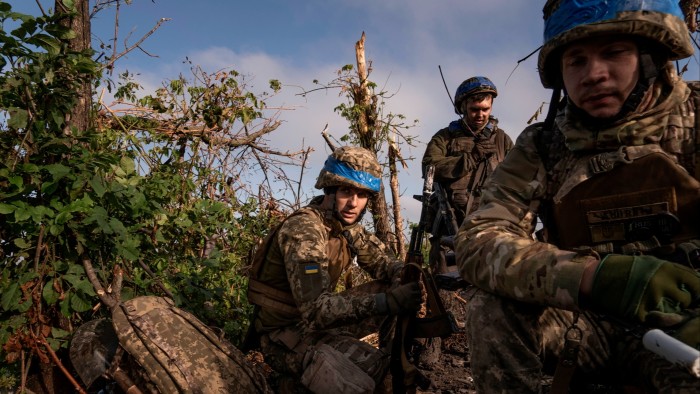Stay informed with free updates
Simply sign up to the Film myFT Digest — delivered directly to your inbox.
When Ukrainian filmmaker Mstyslav Chernov won a Bafta last year for his documentary 20 Days in Mariupol, he addressed the crowd of grandees. The film was an eyewitness record of the start of the Russian assault on his country. Now Chernov ended his speech with a plea: “Let’s keep fighting.” The rallying cry was clearly meant for the US and Europe. The film would soon win an Oscar, too, but outside Ukraine, a creeping indifference to the war could already be felt. (And this before the re-election of Donald Trump.)
In Ukraine, of course, there was always less choice in keeping fighting. Chernov has now made 2000 Meters to Andriivka, a film about what that means later in the course of a murderous invasion. The setting is September 2023. The context is the counteroffensive then recently launched to reclaim Ukrainian land. The targets include the village of the title, located in the southern Donetsk region and just over a mile into territory seized by Russia the previous November.
The film, then, is more time capsule than news dispatch. And yet even at two years’ remove, it feels as urgent as this morning’s headlines, essential to an understanding of the war. As with 20 Days in Mariupol, Chernov delivers stark, unfrilled reportage: a sad and sustained close-up of reality.
Much of what we see comes straight from the bodycams of troops the director is embedded with, alongside cinematographer Alex Babenko. Both are also journalists here with the Associated Press. Neither has a gun, though they too are shelled and fired on as the unit stutters through a thin strip of forest between minefields. Progress is brutal. Soldiers we meet one moment are dead the next. (On-screen, these sights are handled with understated grace.) One likens the advance to being astronauts on a strange planet, where everything is trying to kill them.
Grim shades of science fiction have long defined a war reliant on the use of drones. But here, though the skies buzz with futuristic dread, the scene below could be 100 years ago. The “forest” outside Andriivka is now a charred slough of tree stumps and trenches. Amid the screams for tourniquets, Chernov tells us another bleak truth: that Ukrainian battlegrounds like this now look like world war three and the first world war, All Quiet on the Western Front in 21st-century Donetsk.
The likeness is more than physical, given the contempt for life with which Putin has fed his own men into the Russian military “meat grinder”. As if in rebuke, Chernov shows us the human faces defending Ukraine. Soldiers talk about the wrenchingly everyday: hand-rolled cigarettes, shared connections in Kharkiv. Only Fedya, a bullish warehouse worker turned unit commander, still openly foresees victory for Ukraine, with a splendid future beyond.
Chernov respects Fedya too much to belittle his hope, or to pretend to share it. His own voiceover is haunted by the tutting disappointment of the west at the counteroffensive, and the thought of what will even be left of Andriivka, given how many villages like it Russia has left as ruins and graves. At every turn, this unmissable film is a story about distance: the 2,000 metres to Andriivka; the many miles across Ukraine back to hometown funerals; the quarter inch from total despair Chernov and his country now seem to exist in, fighting a war with no end, and no choice.
★★★★★
In US cinemas now and UK cinemas from August 1
